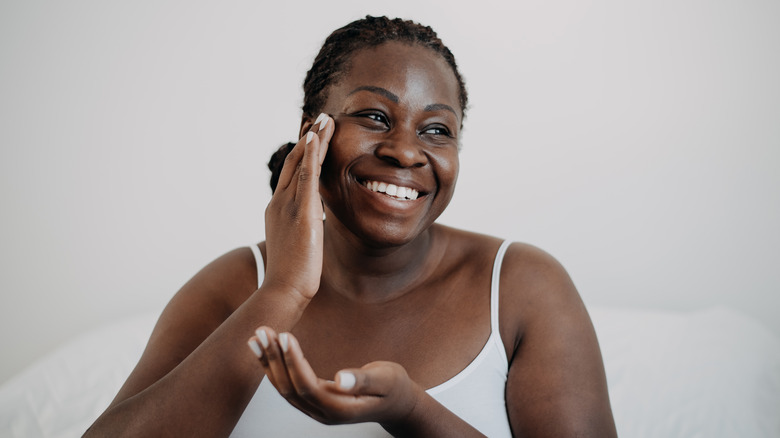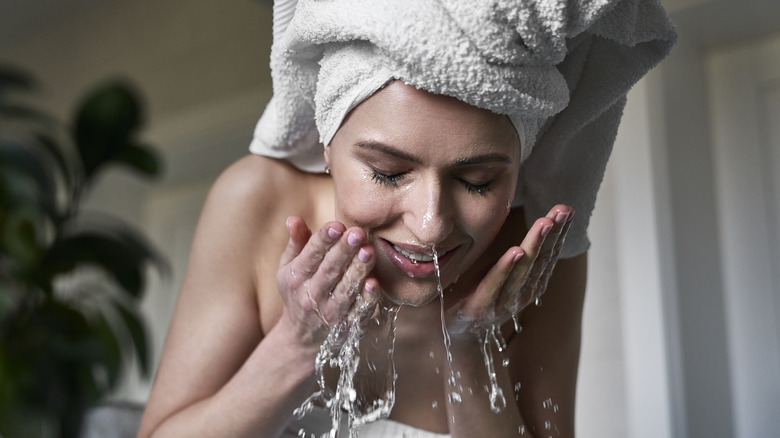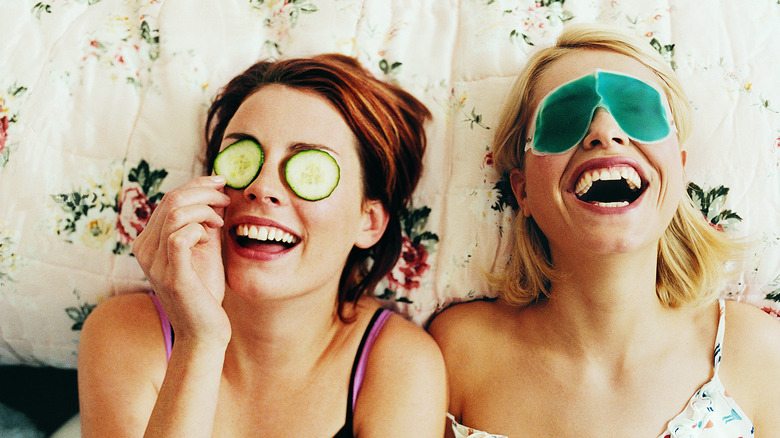Is Your Favorite Skincare Trend Dermatologist Approved?
Whether you're new to the wide world of skincare or you're looking to shake up your old routine, social media has become a hub of knowledge for all things trending. From honest product reviews to DIY skincare dupes, a ton of information from people all around the world is just a click away. But a TikTok search cannot always provide the personalized expertise that a certified dermatologist can ... no matter how many followers an influencer might have.
When it comes to taking skincare advice online, dermatologists urge you to be wary of misinformation. Skincare trends may help you save a few bucks or let you live your self-care fantasy, but these passing trends can also be extremely harmful to your skin. Skin types and textures have a wide range — one person hoping to tackle their excessive oils will not need the same products or routine as someone who is hoping to prevent wrinkles and fight their battle with dry skin. A skincare trend might work wonderfully for someone with acne-prone skin, while the same trend will cause another person to totally break out. According to skin experts, some viral hacks get a dermatologist stamp of approval, while others are TikTok skincare trends you should start thinking twice about.
Skin cycling reminds you not to overuse those powerful skincare products
When you're looking for your next skincare trend, there's no better source than a licensed skincare professional. Luckily for those of us who are chronically online, we no longer have to leave our FYP to get advice from a dermatologist. Dr. Whitney Bowe, who shares her expertise on her TikTok page, began the skin cycling movement last year. You may have heard of this viral trend that consists of cycling through your skincare products every four nights or so, targeting a certain element of your skincare routine each night. Dr. Bowe recommends dedicating one night to exfoliation, another to retinoids, and two nights to "recover ... and hydrate" from the strong products applied the nights before.
Skin cycling has become all the rage for good reason — a majority of dermatologists have deemed that this practice is not only safe, but encourage it due to the harshness of certain products if used excessively. But just like any skincare trend, results depend on the products your skin can handle. Dermatologist and associate professor at Ohio State University Susan Massick shared that "One of the biggest mistakes in skin care I see is when people use more products than are necessary or when people use the wrong products for their skin type." If you find that certain products tend to burn or irritate your skin after use, stop immediately and seek advice from a medical professional for more personalized recommendations.
This TikToker recommends washing your face with shampoo
Elyse Myers is a popular TikToker known for her captivating storytelling, unique editing style, and down-to-earth charm that has gained her 6.5 million followers. But the viral sensation has used her platform to share more than just her taco-filled first date experiences — Myers claims that Equate dandruff shampoo is the secret to her decades of clear skin. In a video with over 1.8 million likes, the creator urges her followers to try this hack with the "Walmart version of Head and Shoulders shampoo" before spending a ton of money on skincare products. In the video, she claims that a dermatologist told her "the zinc in dandruff shampoo is incredible for your face." It wasn't until she stopped using this product many years later that she began to experience breakouts.
While we love Myers and agree that her skin does look great, the $2.84 price tag on this miracle wash seems a little too good to be true — it might be worth getting a second opinion from an expert. VeryWell Health asked board-certified dermatologist Melanie Palm if this TikTok trend has any merit, to which she responded yes, for some people. "Patients with a specific fungal type of acne, known as pityrosporum folliculitis, can benefit from anti-dandruff shampoos due to their antifungal effects." Although some people such as Myers have found fungal acne relief from brands such as Head and Shoulders, dermatologists don't recommend the product for traditional acne breakouts.
Does the rinse and repeat method work for your skincare routine?
We've all seen the directions on the back of a shampoo bottle that tells us to "rinse and repeat" — when your hair is in need of a good wash, scrubbing shampoo on your scalp only once may not provide your hair follicles with the benefits that the bottle promises until you've gotten the dirt and grime out of the way and double cleanse. Could that same reasoning apply to your cleansing routine? Dermatologists say yes, within reason.
Double-board certified dermatologist Dr. Karan Lal told The Zoe Report that the popular double cleansing trend has provided great results to patients who are extremely prone to acne, and recommends it to anyone looking for a deep clean. But just like any skincare trend, the results depend on the type of cleanser you use and the time of day that you choose to double cleanse. Washing twice should most often be done at night, that way you can rid your face of any dirt, oils, or makeup residue left over from the day with your oil cleanser, and then clean your pores thoroughly with a gentle cream cleanser. Any products you choose to wash your face with should correspond with your skin type in order to provide you with the most accurate cleansing without drying out or irritating your skin further. If you aren't sure which products to use, dermatologists recommend always testing on a small section of your skin first before washing your entire face with a new product.
Using these household items as spot treatments are not recommended
We're always looking for a quick way to save some money, but replacing your skincare products with household items isn't always a safe beauty hack. According to dermatologists, most things in your fridge do not belong on your skin.
Some users on TikTok have claimed that a cheap and natural way to brighten dark spots on your skin and give your face a much-needed drink of vitamins is by applying lemon juice to your face. Whether it's juiced and added to a sheet mask like user @nadia_ioana demonstrated or mixed into a lemon scrub like creator @aftrskin does, dermatologists highly advise against this skincare trend. Experts at Healthline report that citric acid can have brightening effects and anti-inflammatory properties, but the harshness of lemon juice can cause extremely uncomfortable reactions when applied directly to the skin. For safe vitamin C application, consider finding a serum at your local drugstore.
Toothpaste is another household item that influencers have been using to tackle difficult acne ... and dermatologists are seriously cringing. Dr. Chris Tomassian posted TikTok criticizing people who apply toothpaste to their blemishes with the caption, "Right to jail!!" While toothpaste does have antibacterial properties, the minty fresh product definitely belongs in your mouth, not on your skin.
This viral tool promises to debloat and shape your face
While scrolling through your FYP, you may have noticed skin care TikTok raving about the gua sha. This smooth-edged tool might be brand new to social media, but the method has been practiced by traditional Chinese healers for generations. According to WebMD, "People use gua sha to treat chronic pain all over their body." But that's not all the method promises — the gua sha has gone viral for its face-shaping results like minimizing a double chin and defining your jawline.
TikTok creator @yurileeeee shared a how-to guide for using a gua sha, which includes a lymph nodes massage, tracing the surface of your face, and plenty of moisturizer for support. According to gua sha users, the technique is supposed to reduce facial swelling and provide serious stress relief. While testimonies are glowing on social media, experts at Curology have not found any medical evidence to support the gua sha's benefits. So if you're looking for a green light from a dermatologist, the closest you'll get is a shrug. While it doesn't seem to be harmful to your skin, there isn't much science to back up the practice — at least not yet.


